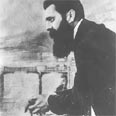
Herzl
Photo: Government Press Office
In most cultures a man's last wish is respected and taken in all seriousness. We strive to honor the last wish as a binding request, whether it was passed on as a written will or verbally. Wills have a clear legal standing: We are obliged to fulfill them. However, Israeli institutions find it difficult to stand up to the religious institutions when it comes to executing wills.
Theodor (Binyamin Ze’ev) Herzl, the visionary of Zionism, requested in his will that he and his family be buried in the Land of Israel. Israel has brought his remains and the remains of his parents for burial in Israel, but not those of his wife and children.
For years the religious institutions in Israel have opposed executing Herzl's last wish. The opposition stemmed from the fact the Herzl's wife asked to be cremated (his son Hans lost the urn while traveling on a train), and also because Hans converted to Christianity, but later returned to Judaism. Moreover, upon the death of his sister Paulina, he took his own life.
In order to execute Herzl's will the Knesset was forced to pass "The Herzl Law" according to which Herzl Day is held annually to commemorate his vision and heritage.
That's how the remains of Hans and Paulina will be brought to Israel and laid to rest beside their father. In order to execute the will in full, the State of Israel will have to add a headstone for Julia his wife and Trude his daughter, who was murdered by the Nazis and her place of burial unknown.
Difficulties
The cabinet also had difficulties in carrying our Ze'ev Jabotinsky's will which stated that he wished to be buried or his body cremated at the place where he finds his death.
His request doesn't differ greatly from other great Jewish figures such as Albert Einstein, Robert Oppenheimer, Arthur Rubinstein and others. Jabotinsky advocated a "revision" of "practical Zionism" which he regarded as following the legacy of Theodore Herzl, the founder of modern political Zionism. As early as 1919 he warned in a newspaper article about a "culture war" in the Land of Israel.
With regards to Arthur Rubinstein, his will was executed and his ashes cast over the Jerusalem hills. This was carried out because the religious institutions were not involved and could not hinder the process.
Institutions' apathy
Over the past year I have also encountered several private cases, in which an injustice to citizens was done when it came to executing their wills vis-à-vis the institutions' apathy.
In one such case, a holocaust survivor had written in her will that she wished to be cremated. To assure that here wish would be fulfilled she ordered the service prior to her death. She asked her daughter to handle the process. Her grandson, a yeshiva student, was very much opposed to the idea and convinced his aunt to have her mother's body buried by the Hevra Kadisha Burial Societies.
Not a single institution tried to uphold this citizen's right to her last wish.
The cabinet's difficulty in executing the wills of Zionist and State leaders, as well as private wills, due to constraints posed by religious institutions, has created a severe crisis, which is callously eating away at the secular way of life. This is another red light, calling upon us to separate state from religion.















